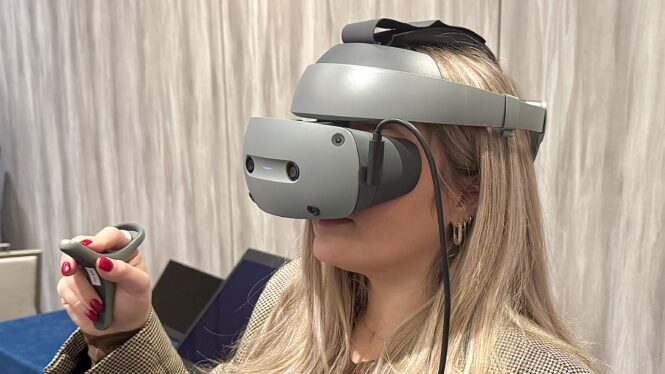At CES last year, Sony teased an AR/VR headset prototype focused on “spatial content creation.” And at the same time, Siemens announced it was working with Sony to use that same hardware, including the two new controllers it developed, for something it was calling the “industrial metaverse.” That’s a lot of buzzwords, but at CES 2025 both Siemens and Sony showed the headsets and associated software in action which helped clear up a lot of what the companies are trying to do here.
During Sony’s CES press conference, it announced its XYN brand of software and hardware solutions, with the headset being a key part of the equation. The XYN “spatial capture solution” uses mirrorless cameras to scan and make photorealistic 3D objects. Using the XYN headset, you can see those objects in 3D production software for animation, video games and other potential uses.
I got a chance to try the XYN headset on, as well as see some samples of the 3D objects that were scanned and manipulated. The demo itself was a little rocky, as so many VR demos can be, but essentially I was placed inside an animated world that had already been constructed. From there, I was able to import a geode / crystal-like object that had been scanned using the spatial capture tools. I could move it all around the virtual space, scaling it up to massive size or shrinking it down to a tiny pebble.
The headset itself felt well-constructed and sturdy for a prototype — the display flips up so you can get back into the real world quickly, and the headband was pretty comfortable and secure. As usual, though, it’s hard to evaluate how it’ll feel after an hour or two around your noggin. The controller wand felt a little fiddly to me — its somewhat unusual shape makes it well-suited to pointing, but figuring out how to “grab” down on things took me a bit. I can’t say how steep the learning curve is, but at least everything felt responsive and well-made.
While the demo itself wasn’t ground-breaking, it was a good example of showing the whole XYN pipeline, from capturing a 3D object to manipulating and using it to build out a virtual environment. Sony says the XYN headset and its controllers are still in the prototype phase, but it wouldn’t surprise me if we find out more about public availability sooner than later.
That’s because Siemens announced this week that what appears to be the exact same headset and controllers are now on sale, albeit with a very different focus. Siemens coined the “industrial metaverse” phrase last year, and I got a chance to learn more about just what that means. It turns out that Sony originally built the headset for internal use for designers and engineers to build things in 3D space. They were already using Siemens software, so the companies started working together to optimize both sides of the experience — and now Siemens thinks they’re at a point where they can sell the headset and software bundles to enterprise customers.
Siemens highlighted its AR capabilities a bit more, showing off how you could pin its NX Immersive Designer and use the headset as a virtual workspace — but one that lets you enlarge and manipulate the 3D objects you’re designing. You can also jump into VR mode and see the objects at full size and move around them using the headset’s controller. In this demo, I got to fly around massive 3D reproductions of a few airplanes, and while they weren’t the most detailed objects, the utility was clear.
I also used the second controller Sony developed in the Siemens demo. In addition to the pointer-style device, I had a ring over my index finger on my left hand. I used that to move around the virtual space; holding and turning my hand a specific direction moved me forwards and backwards or up and down. As always, it took a minute to get my bearings, but I was getting right up close to the virtual planes and “flying” up to check out their details before long.
Siemens is definitely further along in the quest to bring this product to end users: the XR HMD is up for pre-order now for $4,750, and the company says it’ll begin shipping next month. So the hardware is definitely beyond the prototype phase — in Sony’s case, it’s probably more a matter of making sure the whole pipeline of XYN software and hardware works together before making it widely available.
Sony and Siemens definitely face a challenge showing people how these tools can be useful — a four-minute demo doesn’t really do the trick, and I’m neither an engineer nor a “content creator” who might use the XYN tools. But what I find most intriguing about this strategy is that Sony is recognizing that its headset isn’t a broad consumer product; instead, they’re finding different places and industries where it might be useful. At this point, that’s probably a smart strategy, given that consumer-grade AR and VR remains very niche outside of the gaming sphere. But assuming Sony’s headset hardware is up to snuff, it wouldn’t surprise me to see other companies adopt it for their specific needs.
This article originally appeared on Engadget at https://www.engadget.com/ar-vr/sonys-xyn-xr-headset-is-being-used-in-very-different-ways-at-ces-2025-204020872.html?src=rss


Leave a Reply